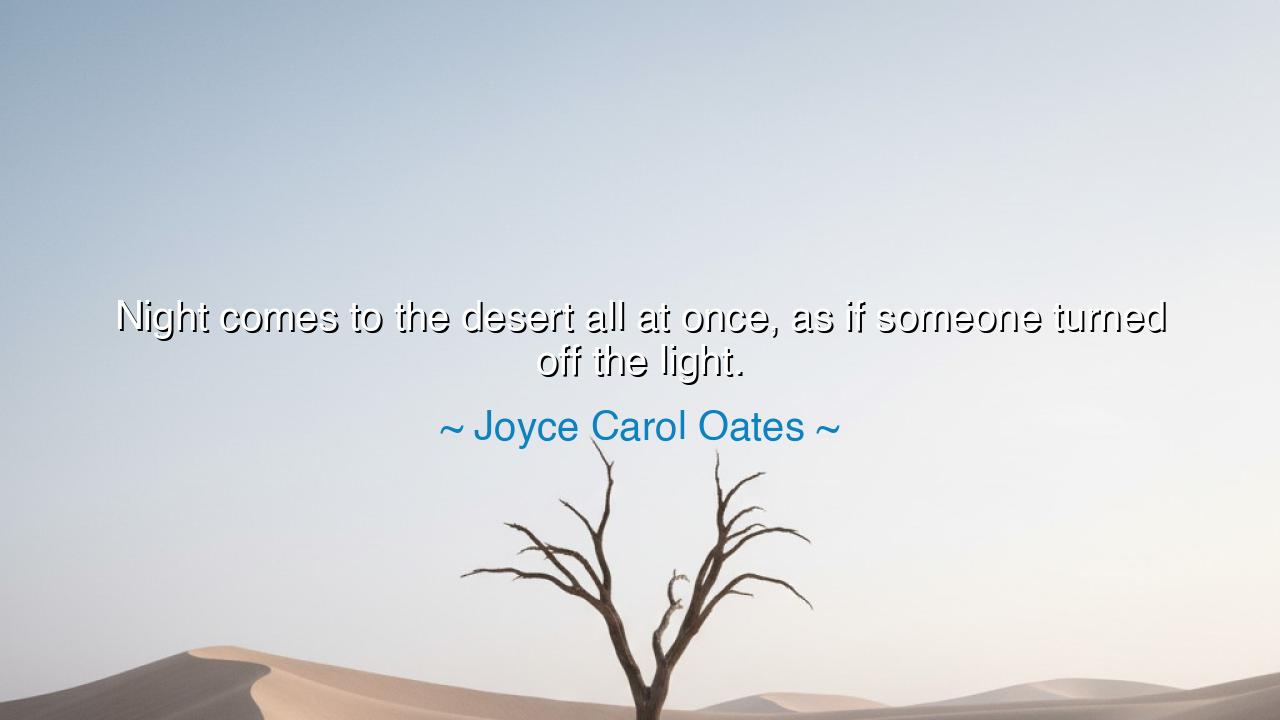
Night comes to the desert all at once, as if someone turned off






Hear the words of Joyce Carol Oates, poet of the human spirit, who declared: “Night comes to the desert all at once, as if someone turned off the light.” In this image lies more than description of a landscape—it is a parable of existence. The desert, vast and bare, does not yield to twilight slowly as in the forest or the valley. There, the light does not fade in gentle shades, but vanishes suddenly, and the world is cloaked in darkness without warning. Thus Oates speaks not only of geography but of life itself, for often our own seasons of brightness are ended in a moment, and night falls before we are ready.
The origin of this saying is rooted in Oates’ craft as a writer who observes both the natural world and the inner life of humanity. She understood that the desert, with its wide horizons and open skies, reveals truths in stark simplicity. Where there is little to soften the horizon, the descent of night is immediate, a sudden severing of light from dark. Yet this phenomenon becomes a metaphor for the way change often strikes in human affairs. Death, loss, betrayal, or the turning of fortune rarely comes with slow warning; like the desert night, it falls at once.
Consider the story of the ancient city of Pompeii. Its people lived in brightness, unaware that beneath their feet a sleeping giant stirred. One day, Vesuvius erupted, and night fell upon the city in an instant. Ash, smoke, and fire turned day to darkness, as if a divine hand had snuffed out the sun. No gradual warning prepared them; their light was extinguished as suddenly as in Oates’ desert. History preserves them as a testament to the truth that change often comes all at once, and the familiar world can be lost in a heartbeat.
So it is also in the lives of men. A family sits together in joy, and in a single letter or phone call, everything changes. A nation lives in peace, and in one sudden act of war, its world is overturned. The desert night is the symbol of all these sudden turnings. It reminds us that the rhythm of existence is not always slow and gentle. There are moments when the light vanishes, when certainty dissolves into shadow, and when we are left to face the silence of night with only the strength we have already cultivated.
The meaning of Oates’ words, then, is both a warning and a call to courage. She teaches that one must not live in complacency, assuming the light will last forever. Instead, one must live with awareness, cherishing each moment of brightness, for it may be cut off in an instant. And when the sudden night comes—as it always will, in one form or another—it is not panic but resilience, not despair but steadiness, that will guide us through.
The lesson for you, listener, is this: prepare your soul for the unexpected. Do not waste the light, for it may be gone before you know it. Use the days of brightness to strengthen your heart, to deepen your love, to plant your seeds of kindness and wisdom. For when the night comes suddenly, as it does in the desert, it is too late to prepare. You must already carry within you the flame that will keep you steady in darkness.
Practical wisdom flows here. Live each day with gratitude, for you do not know how quickly it may change. Speak the kind word today, forgive the old wound now, pursue your noble purpose without delay. When the sudden night falls, let it not find you regretful of wasted hours, but strong in the knowledge that you lived fully in the light. And when darkness surrounds you, trust that dawn, too, comes swiftly, for no night is eternal.
So remember the teaching of Oates: “Night comes to the desert all at once, as if someone turned off the light.” Let it awaken you to the fragility of each day, and to the strength you must cultivate for life’s sudden changes. For though the light may vanish in a moment, the wise heart is never unprepared, and the steadfast soul will always endure until the dawn returns.






AAdministratorAdministrator
Welcome, honored guests. Please leave a comment, we will respond soon